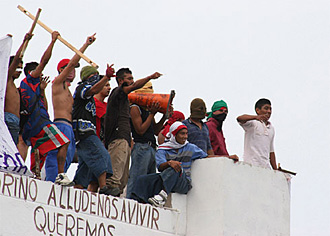 |
 |
 |
 News Around the Republic of Mexico | December 2007 News Around the Republic of Mexico | December 2007  
Mexico's Drug War Could Overwhelm Prisons
 Sergio Solache & Chris Hawley - USA TODAY Sergio Solache & Chris Hawley - USA TODAY
go to original


| | Inmates protest on the roof of the state penetentiary in Cancun, Mexico, last December. (Israel Leal/AP) |
Mexico City — Dangerous and overcrowded prisons could make it difficult for Mexico to put more narcotics smugglers behind bars under a $1.4 billion U.S.-funded crackdown on drug trafficking, experts say.

Prison overcrowding is the highest it has been in at least a decade. There are nearly 217,000 inmates in prisons built for 164,000, according to Mexican government figures. Violence, drug-dealing and corruption among guards are rampant as wardens struggle to control inmates, say inmates and activist groups.

"Nothing but shouting and beatings," said Alberto Orozco, 25, describing the six weeks he spent in a Mexico City prison for robbery. His cell measured 20 by 26 feet, had six beds and housed 10 inmates. "And that was a VIP room," he said.

The Mexican government plans to parole less dangerous convicts to make room for the influx of drug suspects, whose numbers have soared since President Felipe Calderón began sending troops into drug-smuggling hot spots a year ago.

In the first six months of 2007, 124,464 people were convicted in federal courts — more than the 120,539 convicted in all of 2006.

The U.S. government has promised a $1.4 billion aid package, dubbed the Mérida Initiative after the city where the Mexican government broached the idea, to help the anti-drug effort.

Only a small part of the first $500 million the Bush administration has requested from Congress is destined for prisons.

"If they detain more people because of the Mérida Initiative, the effect will be tremendous," said Elena Azaola, a researcher with Mexico's Center for Advanced Studies in Social Anthropology. "The prison system will crash."

A lack of space, water supplies and food could lead to riots, she said.

The Mexican government will try to make room for drug suspects by ramping up parole programs for less dangerous convicts and speeding up criminal trials, which now average 263 days per trial. The number of federal prisoners granted parole has risen by 48% this year.

"We still should be able to receive more inmates in the maximum-security prisons," said José Luis Lagunes López, a spokesman for the federal Public Safety Secretariat, which runs the prisons.

Some prisons pose extreme risks. The Chiapa de Corzo State Penitentiary in southern Mexico has seven times more prisoners than its capacity, according to the federal Public Safety Secretariat. The Copainalá prison in the same state operates at 600% capacity. The Guamúchil Salvador Alvarado prison in Sinaloa is at 500% capacity.

"At any moment, a riot is on the point of breaking out in the prisons," Azaola said.

Violence is becoming more frequent. In 2005, 750 police and soldiers backed by armored vehicles were needed to retake control of the La Palma maximum-security prison after riots.

On Dec. 8, 150 inmates escaped after a riot broke out in a Cancún prison. Most were recaptured, but three inmates were killed and 20 injured. The state prison, which had a capacity of 300 inmates, held 400.

The U.S. State Department singled out the prison system in its 2006 Report on Human Rights Practices in Mexico, released in March.

"Poorly trained, underpaid and corrupt guards staffed most prisons," the report said. "Health and sanitary conditions were poor, and most prisons did not offer psychiatric care."

Inside the prisons, shortages of supplies mean inmates must buy medicine, blankets, beds and food on the black market. That has led to corruption among prison guards. A quarter of all bribes paid in the prisons are to bring in food and clothing, according to a study by the Center for Economic Research and Education.

"You have to buy everything, everything," Orozco said. "If you want to shower with hot water, you have to pay 10 pesos (about $1). To skip roll call and sleep longer, it's 5 pesos."

Hawley is Latin America correspondent for USA TODAY and The Arizona Republic | 
 | |
 |



